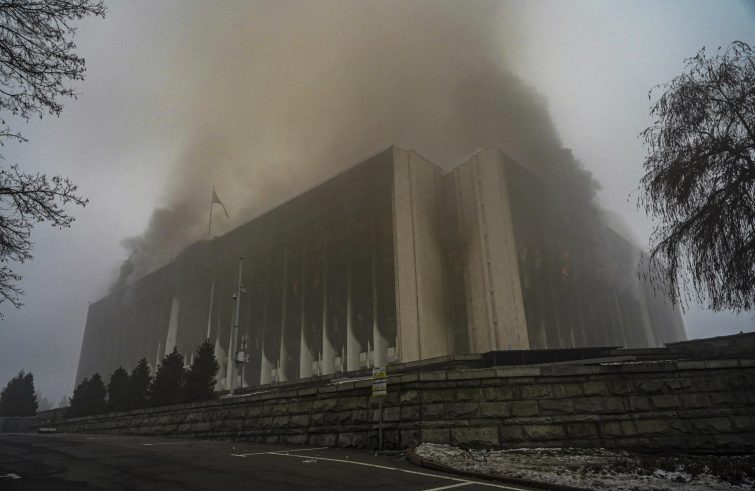
“Life is slowly going back to normal. People are starting to be seen in the streets, the first cafés have reopened and some are back at work. Even public transport is slowly resuming its normal pace. So is the Internet, at least for four hours a day. Schools will reopen on January 17th and universities will reopen on January 24th.” Contacted via phone by SIR, Msgr. José Luis Mumbiela Sierra, Bishop of Almaty, president of the Catholic Bishops of Kazakhstan, gave an overview of the situation in the city in the wake of last week’s violent armed clashes. It is reported that at least 164 people have died, 103 of them in Almaty alone, according to several media outlets citing the Ministry of Health, but the toll cannot be independently verified. “The President has spoken to the entire population today,” the bishop told us, “reiterating the government’s commitment to normalise the situation and rebuild what has been destroyed. Numerous businesses and shopping centres have been damaged. President Kassym-Jomart Tokayev announced a gradual withdrawal of the CSTO (Collective Security Treaty Organisation) forces. Russia, Armenia, Belarus, Kyrgyzstan and Tajikistan sent troops on January 5 to placate the country’s deteriorating conflict. Their withdrawal is unlikely to last more than ten days, according to President Tokayev’s assurances.
Were you afraid?
People were scared by the violence in the streets, with looting and clashes spiralling out of control. However, the protesters did not target religious sites. Our cathedral in Almaty is just along the street where protesters marched by. The parish priest told me that he had seen people holding clubs and stones and that he had closed the doors of the cathedral for fear it might be raided. But the church was not attacked.
It all began as a protest movement against soaring gas prices, is that right?
We still don’t know if the protests against the increase in gas prices was an excuse, a pretext, or if it was accidental. The impression is that these people who resorted to violence were not improvised but fully organised and prepared. Reportedly there were 20,000 armed individuals, 2/3,000 of whom arrived from out of town.
Why Almaty?
With its two million inhabitants, Almaty is the largest city in the country. Astana, with a population of one million, is the political capital, seat of the government and the army. Almaty is the economic capital, the country’s economic and financial hub. In this respect, it is unquestionably a nerve centre.
Kazakhstan is a country with over 100 different nationalities and ethnicities. Are these different groups of people in harmony with each other, or is this a challenge underlying the clashes?
Thanks be to God, in the past 30 years of independence, multi-ethnic coexistence in Kazakhstan has been peaceful, also thanks to the Government, which has promoted multiethnic harmony wisely and successfully, encouraging encounters and showing that diversity is a source of richness. And thanks be to God, the Catholic community of this country, although very small, is also multi-ethnic. Our faithful include people from Europe as well as from Asia.
What is your vocation as Catholic Church for this country?
Our mission is to be a family of peace, to be a beacon of light in the world like Jesus, to bear testimony to the values of the Gospel, not only in spiritual terms but in a fully human way, encouraging and promoting justice, solidarity and coexistence.
We feel we have no special agenda except to be good Christians in this land.
The Pope referred to Kazakhstan during the Angelus prayer last Sunday, calling for the pursuit of dialogue, justice and the common good as a path towards social harmony. What were your feelings upon hearing his words?
As a matter of fact, I was unable to hear the Pope’s words on Sunday. There was no Internet access and no TV. Among other things, we could not even communicate it to the people, who were all confined to their homes and lacking all means of communication. We later published the Pope’s remarks on our networks. The fact that the Holy Father spoke about Kazakhstan is a sign of communion.
His call for dialogue and fraternity is the way forward for this country.
How do you see the future of Kazakhstan today?
The future hinges on Jesus’ words in the Gospel, “blessed are the peacemakers”. Not only are we called to pray for peace – Lord, make me an instrument of thy peace – we are also called to be proactive peacemakers. Peace is a gift from God, but it is also the fruit of our efforts and of our personal commitment. Peace is also the dream of a multi-ethnic, multi-religious Kazakhstan, a Kazakhstan of concord. We are dreaming, but we are also working to make this dream come true.
Will the Pope be visiting Kazakhstan?
This is our other dream. We wrote a letter to the Holy Father inviting him to visit us. After the critical situation we have just experienced, I think it would be wonderful if the Holy Father could visit Kazakhstan and help this country to confidently move on to a new phase in its history.











